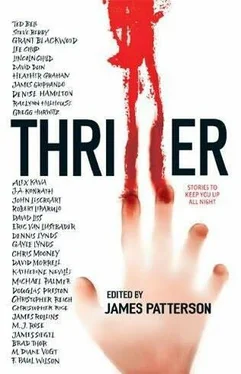"You had this whole thing planned out," Marlena said, more to herself.
"I needed to move you to safety, and the only way to do it was to get you on the boat, away from the club." Marlena felt Fletcher's breath against her ear. "Those postcards and whatever other items you've bought since your mother's death? I suggest you bury them."
Her hands were cut free.
"I'll leave Jacobs tied up, in case you change your mind. Good luck, Marlena."
The cigarette boat roared away. She got to work untying the rope around her ankles. She didn't rush. She knew there was no way she could catch up to Fletcher.
During the commotion, Jacobs had managed to rub off part of the duct tape from the corner of his mouth. "I have an account set up here on the island," he mumbled. "I'll transfer the money to you. All I need is a laptop. You let me go, and I'll disappear. You'll never see me again."
Marlena didn't answer.
"Seven million," Jacobs said. "That kind of money can buy you a lot of things."
But it can't buy me what I need, Marlena thought, and went to start the boat.
"Wait, let's talk about this," Jacobs said. "We can come to some sort of agreement."
Marlena drove toward the bright lights of the island. She heard Jacobs screaming over the roar of the engines and wind, pleading with her to make a deal. Marlena drove faster and thought of her mother falling through the sky and tried hard not to dwell on the limitations of justice.
Both a literary and suspense novelist, Dennis Lynds is credited with bringing the detective novel into the modern age then, twenty years later-in the 1980s-introducing literary techniques that propelled the genre into its current dynamic form. An award winner, Lynds wrote under several pseudonyms, publishing some eighty novels and two hundred short stories. His most famous pen name was Michael Collins. Under that label he created fiction's longest-running detective series, starring the indelible private eye Dan Fortune. The New York Times consistently named Lynds's mysteries among the nation's top ten. One year, it listed two of his titles, each written under a different pseudonym, without realizing he was the author of both. His awards include both the Edgar and the Marlowe Lifetime Achievement.
Lynds also published literary novels and short stories. Five were honored in Best American Short Stories. Then, in the late 1980s and into the 1990s, he pioneered the detective form again, writing books in both third and first person and lacing them with short stories, techniques which today's writers employ regularly.
"Powerful and memorable, [these works] indicate Collins has embarked on a new course after some 60 books," wrote critic Richard C. Carpenter in Twentieth Century Crime and Mystery Writers. "Truly, he is a writer to be reckoned with." Of his most recent short story collection, Fortune's World, the Los Angeles Times commented, "To spin tales as intriguing and thought provoking as these for three decades is a remarkable enough achievement. Even more remarkable is the sustained quality… It takes style to bring that off. Bravery, too, of course."
Iconoclastic, witty and generous, sadly Lynds died August 19, 2005, at the age of eighty-one. Several of his short stories will be published posthumously, including the one here, Success of a Mission. This story was first published in 1968. Since then, it has been nominated for several awards and anthologized. The story is still relevant today in both its triumph and its tragedy.
The minister of defense stood with his back to the room. He faced a large map on the wall of his office.
"They will attack," the minister said. "If we do not know the locations of their ammunition dumps, supply depots and fuel stores, we cannot stop them."
The minister turned. He was a small man with a round face that would have been kindly except for the hard gray surface of his eyes. These hard gray eyes studied the faces of the other two people in the room the way a scientist would study a specimen on a microscope slide.
"That data would only be at army headquarters in their capital, Minister," the tall infantry captain said.
The minister nodded. "Yes. Our man at their headquarters knows that much, has already located exactly where they are in the building."
"He cannot get the data for us, Minister?" the woman asked.
"No. He cannot get into the building. It would be quite impossible in his disguise, and in any case we need him to remain in his present position. His contacts are too low level, and we have no other reliable agents with the necessary experience at their headquarters for a job of this degree of difficulty, sensitivity and importance. There is no time to place an undercover man in the headquarters now. It will have to be a single swift operation from outside army headquarters. Get in, get the data, bring it back without them being aware that we have it."
The woman paled under her olive complexion. There and gone, the quick fear, but it had been there. She was little more than a girl, despite her officer's uniform. Her face was oval, with a small nose, wide and full lips and soft brown eyes. She had been in the army three years, and had killed four men with a knife in the dead of night, but she paled as the minister described what would have to be done at the headquarters of the enemy's army in the heart of enemy country.
The tall man only nodded. "When do we leave?"
His voice, when he said this, was low, and had a faint trace of an accent different from that of the woman and the minister. There was a long scar on his lean, tanned face. The middle finger of his left hand was missing. His almost-black eyes showed no expression.
"In ten minutes, Captain. All your papers are ready," the minister said. "You, Captain Hareet, will be an American automobile salesman on a long-planned combined vacation and business trip that could not be canceled despite the crisis. We have picked you for this job because of your experience, your colloquial American English and your command of Arabic. With some darkening of the skin, your features will also pass as Arab, if that becomes necessary. You know their army and their city."
Captain Hareet nodded. "Yes, sir. I know both only too well to lose a war to them."
The minister faced the girl. "Lieutenant Frank, you will be his wife. Your home is in Santa Barbara, California. You have lived there, and no special regional accent is required for an educated Californian. Standard American will do. Your Arabic will pass in an emergency, but we hope there will be no need. It is hard for a woman to infiltrate in Arab countries."
"Yes, sir," Lieutenant Frank said. The shiver in her voice was so faint no one but a man as trained as the minister, or Captain Hareet, would have caught it, and it disappeared as quickly as it had come. The two men looked at each other, nodded, and then smiled at the woman.
"You are lovers?" the minister asked.
The captain was silent. Lieutenant Frank hesitated for a moment. Then she nodded. "Yes, sir. Paul and I have lived together for over a year. We were lovers before that. We planned to marry soon, but that will have to wait now until after the crisis has passed."
"I am sorry for that, Lieutenant, but it is good that my information is correct."
"Is such information necessary?" Captain Hareet asked.
"All information is necessary," the minister said. "In this case, it might be vital. You will be posing as man and wife under the most careful scrutiny of every foreign national who arrives in their country at this moment. They will expect us to send spies, try to learn what their plans are. Women who are not married tend to act like coy maidens at the wrong moment. They forget. To act like she sleeps regularly with a man, a woman must be sleeping regularly with the man. Men who are not married don't know how to act with a wife at all."
Читать дальше












